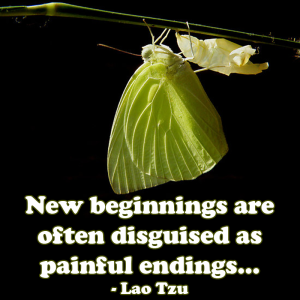 We all fall into a funk every now and then. It’s not a fun place to be. You have less energy, it’s harder to get things done, and all the color and joy can drain out of life for a time. But what causes funks, and how can we pull ourselves out of these periods so we can get on with enjoying our miraculous lives?
We all fall into a funk every now and then. It’s not a fun place to be. You have less energy, it’s harder to get things done, and all the color and joy can drain out of life for a time. But what causes funks, and how can we pull ourselves out of these periods so we can get on with enjoying our miraculous lives?
The usual cause of funks (other than the chemically induced variety) is a change, either self-directed or externally meted out.
All life changes can bring about funks. Both bad things (deaths, divorces, job losses) and good things (new kids in your life, promotions, new fortune) can contribute to “funk-ness.” Even small changes in our environments can bring about uncertainty and a consequent funk.
As William Bridges, noted authority on transitions, tells us, it’s not so much the change that’s a problem. It’s how our minds handle it.
What happens to me in these situations is that I cling to the past. I compare what’s going on right now with what it used to be like. And my Knower/Judger judges my current reality as inferior or in some way not good for me…hence, I become grumpy!
In the Bridges model, there are three stages in how our brain deals with change:
• An ending
• A neutral zone
• A new beginning
Funks happen in that neutral zone.
I deny the ending by looking back.
I fear for the future by projecting that I don’t know how things will work out.
What I don’t do is use my Learner/Researcher to see what’s happening right now. I’m not, as Eckhart Tolle would say, present.
In a recent blog entry, Phil Drolet gave me five steps to get out of my funk:
1. Take responsibility. Happiness and its antithesis, funk-ness, are choices. Choose the one you actually want.
2. Be here now. This is my particular challenge. I look back and wish for what was. And I fear what could be tomorrow. We only really have this moment.
3. Surrender to what is. Tolle tells us that it isn’t the situation we’re in. It’s our thoughts about the situation that cause our struggle.
4. Stop the hamster wheel. In my regular world, I have thousands of thoughts going on in my head. Some happen serially. Many happen simultaneously. Most are mere clutter and of no value. I work at meditating and getting to the “no-mind” state of trying to stop the thoughts.
5. Get out of your head and into the world. Get busy. Find a charity to jump into. Play volleyball. Help a neighbor move. Connect. The world isn’t about me. My brain says it is (hence the funk). It’s not. It’s about connecting and being of value to others. Isolation only prolongs my stay in the neutral zone. Hook up!
Notice the theme here? It’s not the change that is responsible for the funk. It’s the brain. I like Mary Lore’s concept: “We are not our brains.” They are to be used as tools, not as managers of our lives.
Funks are a fact of life…because change is a fact of life…and transitions are a fact of life. Vicious circle. Choice is the exit ramp!




Kim WOW Your message was right on. It was like you were walking
thru my mind today…….but then again that is only a short stroll
Thanks Seth
Funk-ness is common, Seth. I need to decide if that’s the feeling I want or choose another.
Kim